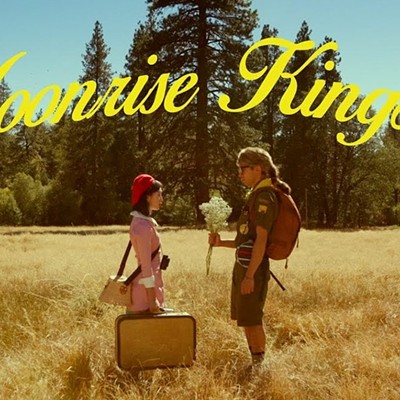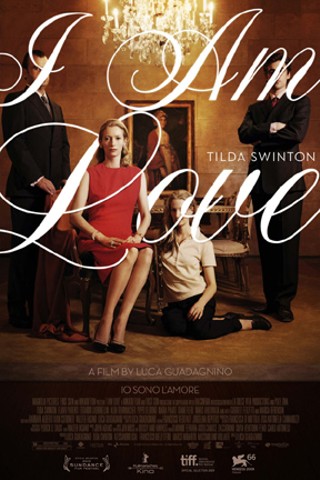Tilda Swinton is an incredibly gifted and determined actress.
This is not a revelatory statement; after all, she already has one of those quaint golden Oscar action figures on her mantle (for Michael Clayton). However, Swinton had never really blown me away before. In fact, I find her participation in the Narnia films tiresome and annoying.
But if her place in Narnia is what pays the bills and enables her to make astoundingly good pictures like I Am Love, then I can almost forgive the existence of the "Jesus is a lion" movies. Not quite, but almost.
This is an Italian movie, and Swinton learned how to speak some Italian and Russian for the part of Emma Recchi. Not only does she speak fluent Italian in this movie; she does so with an authentic Russian accent—and she makes all of it seem natural and easy. It's as if she's been starring in Italian movies her entire career.
Writer-director Luca Guadagnino and Swinton establish Emma as a muted figure. Born in Russia and whisked away to Italy in early adulthood by a rich textiles-manufacturing husband, Emma has raised three children and learned to speak Italian; she presides over her family like an event organizer hired for the weekend.
The movie begins at a birthday dinner for the Recchi family's patriarch, a dying, arrogant man so steeped in tradition that he complains when Emma's artistic daughter, Elisabetta (Alba Rohrwacher), hands him a lovingly framed photograph as a present. Because he usually receives a drawing from her, he dismisses the gift as a novelty and tells her she still owes him a drawing.
This little moment does a lot to illustrate male attitudes toward women in the Recchi family, who are more like employees with nice benefits rather than actual family members. Steer from tradition, and it will be met with quiet, mannered disdain. The older men aren't ill-tempered or violent, but they are emotionally stilted, and treat their wives like dolls.
After dinner, a meek, attractive chef named Antonio (Edoardo Gabbriellini) stops by with a cake he's baked for Edoardo Jr. (Flavio Parenti), Emma's oldest son, a peace offering for tying him in a sporting event earlier in the day. Antonio meets Emma and is invited in, but politely declines, as if afraid to mix too closely with the upper class.
After a brief exchange, Emma walks away. Swinton is so beautiful in this moment; Guadagnino knows that a simple shot of her walking away, as seen through the eyes of Antonio, is enough to establish his instant, passionate attraction to Emma. Nothing needs to be said.
While Guadagnino favors subtleties in the film's opening moments, that changes when Emma ventures outside of her cavernous mansion to have lunch at Antonio's restaurant. He fixes a plate of prawns for her, which Emma consumes as if the food is providing sexual gratification. When Antonio stops by the table to see how things are going, Swinton acts like somebody who just got busted pleasuring herself under the covers. Somehow, Swinton actually makes this quite dignified and beautiful.
This moment kick-starts Emma's sexual and spiritual awakening, and the movie comes to life right along with her. When Emma spies Antonio on a city street, John Adams' majestic score becomes jaunty. His score continues to accentuate Emma's emotions throughout the rest of the film.
Emma's transformation isn't entirely happy. When Antonio undresses her, it's like he's emotionally detached, peeling back the layers of clothing like layers of an artichoke. It's a strange but effective sequence in which Antonio goes from sympathetic to possibly being no better than the elder Recchi males.
The look of the film has a classic sweep that brings to mind the works of Francis Ford Coppola and even Alfred Hitchcock. The inside of the Recchi estate is reminiscent of the Corleone compound, from its cold physical appearance to its antiquated social structure (although nobody gets shot in the face). At times, Swinton looks not unlike Kim Novak in Vertigo (the ultimate cinematic example of the objectification of women); her hair when worn up features that same circular twist in the back.
The only truly virtuous male in the film is the young Edoardo, who fights for workers' rights at his family's factory, and offers a sensitive ear when his sister reveals a big secret. Guadagnino's script seems to be saying that the world has a place for sweet guys like Edoardo after all. If there's any slight flaw to the movie, it's that it might be a little too preachy.
But by the time the credits hit, after a wild and exhilarating final sequence, any flaws are forgiven. Swinton and Guadagnino's passion project is a standout motion picture featuring a performance that marks a new high in Swinton's career.












